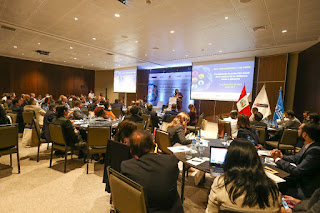Poverty Caused By Natural Disasters Is Able To Prevent
LIMA CITY, Peru – Latin
American countries are looking for strengthening their systems of social
protection in case of natural disasters due to
they seem to turn more frequent and intense, what put the life of the
people and the economy of every territory under risk. In consequence, they can
slow down the advance in reduction of poverty.
The
Latin American countries are mostly exposed to natural disasters, what
motivated the Ministry of Development and Social Inclusion (MIDIS as in
Spanish), the World Bank, and the United Nations’ World Food Programme (WFP)
join to organize a forum for sharing practices and learned lessons about the
adaptative mechanisms of social protection
that allow to innovate management tools which benefit the poorest and
vulnerable population.
The
officials and experts of 26 Latin American and Caribbean countries with the
specialists from participant institutions focused on analyzing adaptative systems
of social protection that have the purpose of minimizing the impacts of natural
disasters in vulnerable targets. MIDIS’ Minister Paola Bustamante
predicted they are thinking about a resilience strategy for non-poor people who
can fall in poverty due to natural disasters. WFP’s top oficial Tania Goossens
says there is already one and it is being applied on almost affected
population.
“Only
for instance, in 2017, in facts happened in Peru, Dominica, and Mexico, the
impact of those disasters reached 100 casualties and US$ 12 billion in losses,” World Bank’s
Alberto Rodríguez said.
In
the last 15 years, Latin America and the Caribbean have reached remarkable advances in reducing
poverty and increasing the medium class. However, before a climatic or
geophysical shock, the transitory poverty can increase significantly because
the homes use strategies to mitigate the impacts of the disaster such as the
reduction of incomes or the sell of family and productive assets.
Natural Rage
In
2017, Maria Hurricane smashed Dominica causing damages and losses raising 226%
of its gross domestic product (GDP) (US$
1.3 billion), leaving 27 casualties and
60 missing people at least, damaging 90% of homes in the country. In the same year,
Peru experienced one of the major disasters in the last 20 years – Coastal ElNiño. This phenomenom had very important social and economic effects – 114 died
people, more than 200.000 damaged people, more than a million of affected
people, and a 8-billion-dollar reconstruction cost, approximately.
In
that period, Mexico also faced two tropical storms, three hurricanes, and two
big-magnitude earthquakes in a 2-month lapse. Those events resulted in more than
470 casualties, affected more than 12 million people, and caused damages and
losses for approximately US$ 2.5 billion. In Central America, the increase of
hurricanes intensity can cause losses between 0.9% and 1.6% of GDP.
The
region has a tradition in setting up non-deductible systems of social
protection focused on the poor and vulnerable population. This represents an
unique opportunity to use the programmes and systems of social protection as means
to increase the resilience of poorest and most vulnerable homes, minimizing the
impact of natural disasters and climate change this way.
The
World Bank and other international
organisms are giving technical assistance to set up flexible systems of social
protection in many Latin American and Caribbean countries. In the same way,
since 2015, the WFP’s regional strategy targets to strengthen the national
systems of social protection and to promote a social protection for being more
reactive before disasters, productive and adaptative too, and sensitive to
nutrition either.
The
Peruvian Government, through the MIDIS, is working now to be one of the pioneers
in adequatting its social protection systems by incorporating the disasters
risk management in favor of the most vulnerable population in the country.
The photos on this post were provided by the MIDIS.





Comentarios
Publicar un comentario